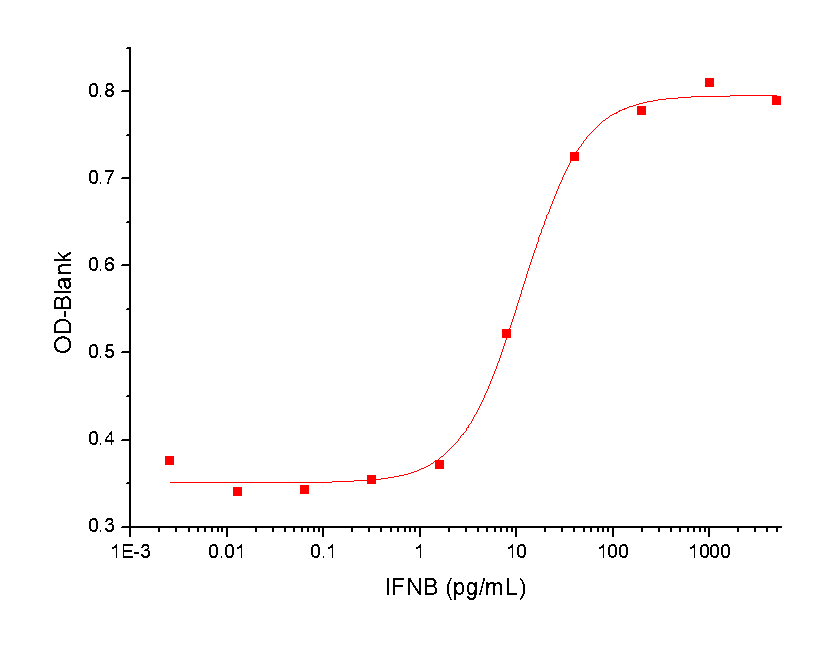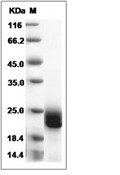购物车
全部删除  您的购物车当前为空
您的购物车当前为空
别名 干扰素, interferon, β1, fibroblast, interferon, beta 1, fibroblast, Interferon β, Interferon beta, IFN-β, IFN-beta, IFNB, IFF, IFB
IFN-beta Protein, Human, Recombinant is expressed in CHO mammalian cells. The predicted molecular weight is 20 kDa and the accession number is P01574.

IFN-beta Protein, Human, Recombinant is expressed in CHO mammalian cells. The predicted molecular weight is 20 kDa and the accession number is P01574.
| 规格 | 价格 | 库存 | 数量 |
|---|---|---|---|
| 5 μg | ¥ 983 | 3日内发货 | |
| 10 μg | ¥ 1,630 | 现货 | |
| 20 μg | ¥ 2,750 | 现货 | |
| 50 μg | ¥ 5,160 | 5日内发货 | |
| 100 μg | ¥ 8,350 | 5日内发货 | |
| 200 μg | ¥ 13,900 | 5日内发货 |
| 产品描述 | IFN-beta Protein, Human, Recombinant is expressed in CHO mammalian cells. The predicted molecular weight is 20 kDa and the accession number is P01574. |
| 生物活性 | Measured in antiviral assays using WISH cells infected with vesicular stomatitis virus. The ED50 for this effect is typically 2-20 pg/mL.  |
| 研究背景 | Interferons (IFNs) are natural glycoproteins belonging to the cytokine superfamily and are produced by the cells of the immune system of most vertebrates in response to challenges by foreign agents such as viruses, parasites, and tumor cells. Interferon-beta (IFN beta) is an extracellular protein mediator of host defense and homeostasis. IFN beta has well-established direct antiviral, antiproliferative, and immunomodulatory properties. Recombinant IFN beta is approved for the treatment of relapsing-remitting multiple sclerosis. The recombinant IFN beta protein has the theoretical potential to either treat or causes autoimmune neuromuscular disorders by altering the complicated and delicate balances within the immune system networks. It is the most widely prescribed disease-modifying therapy for multiple sclerosis (MS). Large-scale clinical trials have established the clinical efficacy of IFN beta in reducing relapses and slowing disease progression in relapsing-remitting MS. IFN beta therapy was shown to be comparably beneficial for opticospinal MS (OSMS) and conventional MS in Japanese. IFN beta is effective in reducing relapses in secondary progressive MS and may have a modest effect in slowing disability progression. In addition to the common antiviral activity, IFN beta also induces increased production of the p53 gene product which promotes apoptosis and thus has a therapeutic effect against certain cancers. The role of IFN-beta in bone metabolism could warrant its systematic evaluation as a potential adjunct to therapeutic regimens of osteolytic diseases. Furthermore, IFN beta might play a beneficial role in the development of chronic progressive CNS inflammation.Cancer ImmunotherapyImmune CheckpointImmunotherapyTargeted Therapy |
| 种属 | Human |
| 表达系统 | CHO Cells |
| 标签 | Tag Free |
| 蛋白编号 | P01574 |
| 蛋白构建 | A DNA sequence encoding the human IFNβ (P01574) (Met1-Asn187) was expressed. Predicted N terminal: Met 22 |
| 蛋白纯度 | > 95 % as determined by SDS-PAGE  |
| 蛋白性状 | Lyophilized powder |
| 缓冲液 | Lyophilized from a solution filtered through a 0.22 μm filter, containing 10 mM NaAC, 40 mM Arg, 0.12mg/ml Met, 146mg/ml Sucrose, 0.1% PF-68, pH 4. 5. Typically, a mixture containing 5% to 8% trehalose, mannitol, and 0.01% Tween 80 is incorporated as a protective agent before lyophilization. |
| 复溶方法 | A Certificate of Analysis (CoA) containing reconstitution instructions is included with the products. Please refer to the CoA for detailed information. |
| 别名 | 干扰素, interferon, β1, fibroblast, interferon, beta 1, fibroblast, Interferon β, Interferon beta, IFN-β, IFN-beta, IFNB, IFF, IFB |
| 内毒素 | < 1.0 EU/μg of the protein as determined by the LAL method. |
| 分子量 | 20 kDa (predicted); 20-23 kDa (reducing conditions) |
| 运输方式 | In general, Lyophilized powders are shipping with blue ice. |
| 存储 | It is recommended to store recombinant proteins at -20°C to -80°C for future use. Lyophilized powders can be stably stored for over 12 months, while liquid products can be stored for 6-12 months at -80°C. For reconstituted protein solutions, the solution can be stored at -20°C to -80°C for at least 3 months. Please avoid multiple freeze-thaw cycles and store products in aliquots. |
对于不同动物的给药剂量换算,您也可以参考 更多